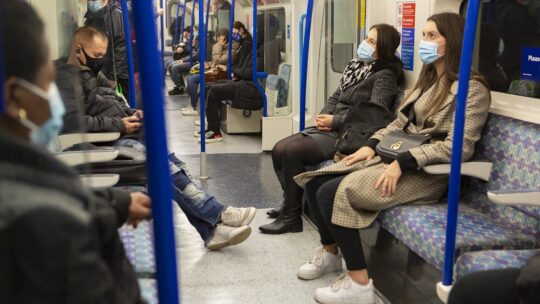
Last Monday (April 18), a federal judge lifted the Biden administration's mask mandate for public transportation. While some Americans celebrated, others believe the move will increase COVID cases. Such is the current uncertainty of life in the United States.
Meanwhile, major US airlines followed the White House's lead. Most notably, Delta Airlines, in a now-viral video, told travelers mid-flight that masks are optional. Cheers erupted on flights. About 80 percent of passengers removed their masks, reports show.
Under its new policy, Delta makes masks optional for staff and customers. “We are relieved to see the U.S. mask mandate lifted to facilitate global travel as Covid-19 has transitioned to an ordinary seasonal virus," Delta said in a statement. "Thank you for your support in complying with the federal mask mandate and keeping each other, and our customers, safe during the pandemic."
Emblematic of the mixed attitude toward COVID, Delta subsequently walked back the phrase "ordinary seasonal virus" after social media criticism of it.
Conflicting Sentiment
The divide over lifting mask mandates has pierced the hospitality industry, says Dr. Jan L. Jones, program coordinator for hospitality and tourism management and professor at University of New Haven.
“I think there are people working on the frontlines who are very nervous about these mask mandates being lifted, especially since COVID is still around,” Jones says. “But I would say there's an overwhelming excitement...because [I believe] it is 100 percent impacting their ability to do business.”
Stacy Royal, Principal of the Decker/Royal Agency, agrees that the lifting of the mask mandate is being met with casual optimism. Says Stacy, “As mandates continue to change, many brands are leaving it up to guests to make the individual choice.”
For example, Stacey references the guided tour brand, Trafalgar, who allow their guests to decide if they wear a mask as long as they follow local mandates in the destinations they visit. Since they require guests to be vaccinated for travel, they trust that they will be safely protected no matter the decision they make.
Further evidence of the country's uneasy coexistence on masks and COVID is a tracking study of American travelers from Longwoods International. It concludes an increase in COVID-19 cases will not deter travel this year. Only 19 percent of travelers surveyed say COVID will influence their travel plans during the next six months.
Amir Eylon, president and CEO of Longwoods International, asserts COVID’s “impact on travel and tourism is trailing off.” Major concerns for most travelers now are gas prices and other forms of inflation, Eylon says.
The Proper Procedure
Government officials' conflicting narratives have baffled companies on the best ways to convey COVID updates to employees and customers. Moreover, with COVID's progress in somewhat of a holding pattern, companies remain unsure about adopting policy changes. As the Delta statement shows, conveying new policies may be tricky.
Jones says companies should start with website updates.
“Websites need to be updated as soon as possible because they are the first point of contact for a lot of people,” says Jones. “And the more information you can provide the better.”
She suggests starting with the company's list of requirements and providing links to state and federal regulations. This way people can “conduct their own research beyond what the industry is doing.” Of course, emailing your customer base, if possible, is a direct way to keep it updated on constant changes.
Royal adds, “Often there’s a feeling that statements need to address every potential question but it’s always smarter to add, rather than rescind a message, as more details become available.”
Jones also emphasizes the importance of training frontline employees. Companies' biggest challenge is "that these things change so quickly,” she says. “Sometimes people on the frontline don’t have the most recent information.”
Transparency
In her experience, Jones points out that sectors and companies providing simple instructions on their websites or convenient pop-ups are doing well.
“As a traveler now, you have to check everything before you go out. Not just transportation, but where you are eating or the events you’re going to,” Jones says. “Like I'm going to the Museum of Natural History with my son this weekend. You go to their website and there are pop-ups that immediately tell you their COVID regulations.”
The key, according to Jones and Royal, is to be transparent and clear about updates and ways in which customers and employees should adapt to them based on industry standards.
“Confusion in the marketplace can lead to chaos,” says Royal. “this is why clarity, transparency and brevity are key when managing crisis situations.”
Andrew Byrd is a media associate at PRNEWS
